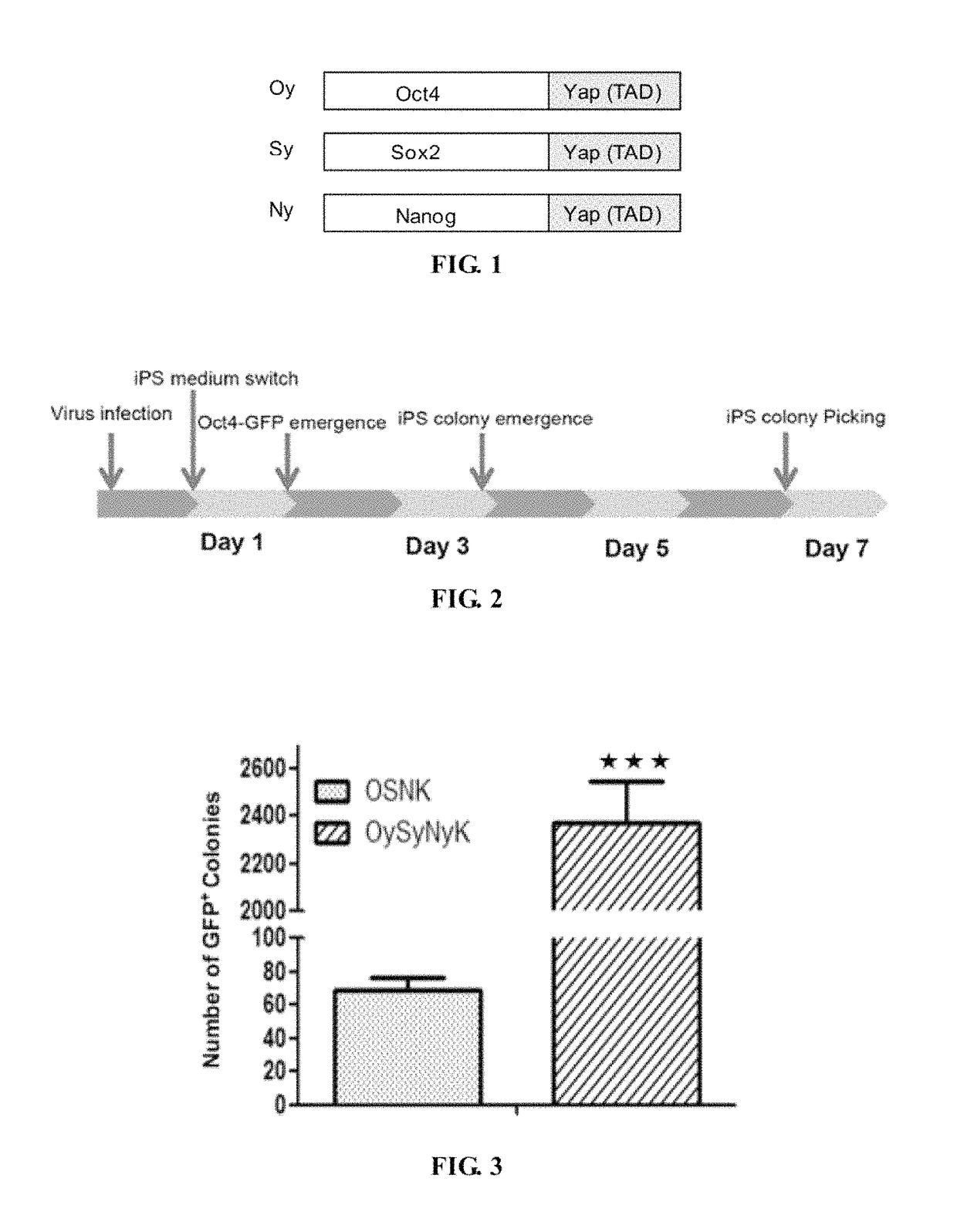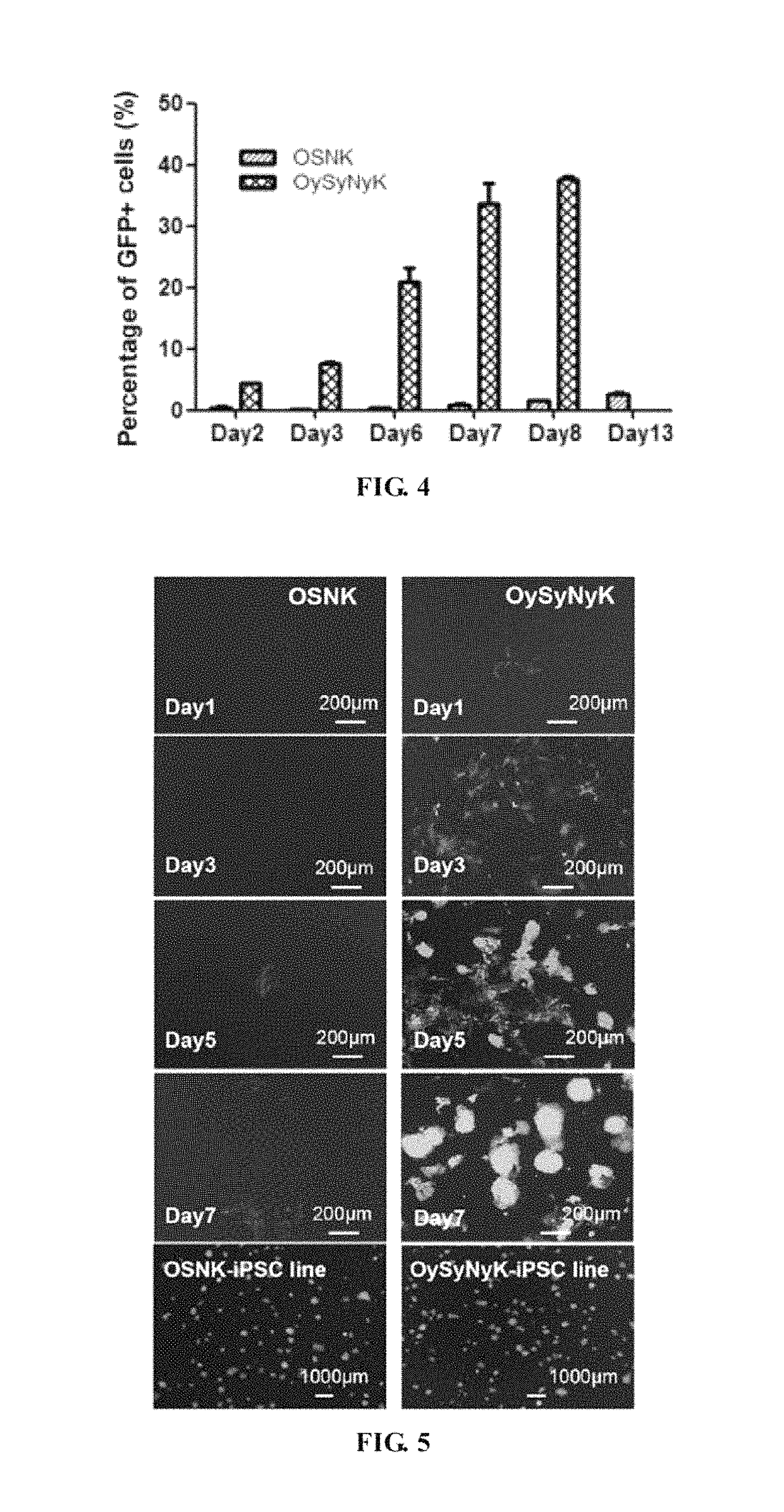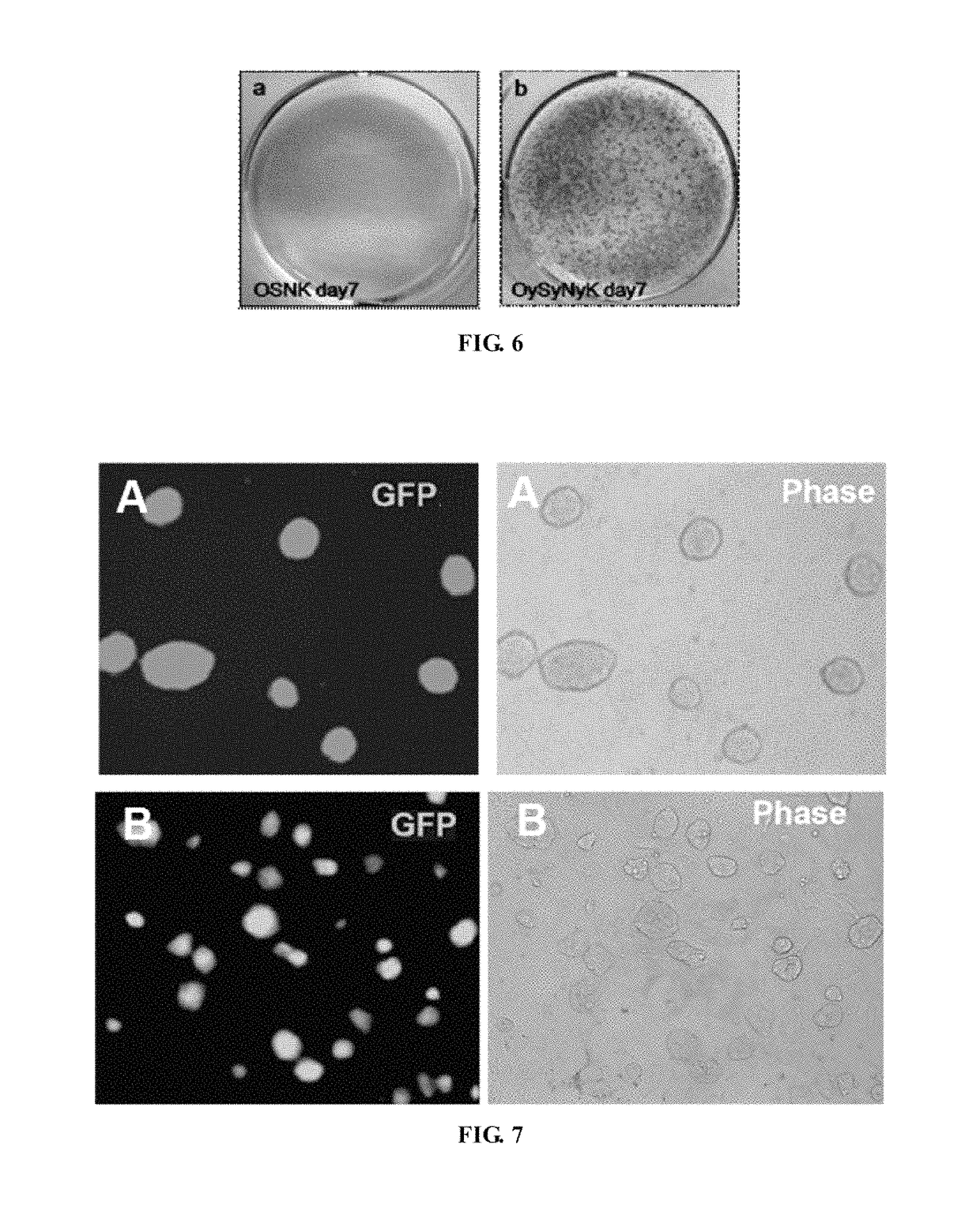Fusion protein for inducing pluripotent stem cells and application method thereof
a technology fusion proteins, applied in the field of pluripotent stem cells, can solve the problems of serious ethical problems in scientific community, the use of embryonic stem cells in clinic, and the resource of human embryonic stem cells especially patient-specific stem cells, and achieve the effects of improving safety, significantly accelerating induction speed, and significantly elevating induction efficiency
- Summary
- Abstract
- Description
- Claims
- Application Information
AI Technical Summary
Benefits of technology
Problems solved by technology
Method used
Image
Examples
embodiment 1
Pluripotent Stem Cells by Using OySyNyK Method
1.1 Main Reagents and Materials
[0070]HEK293T culture media formula: high-glucose DMEM culture media, which was added with 10% fetal bovine serum as well as penicillin 100 U / ml and streptomycin 100 μg / ml in final concentrations.
[0071]MEF culture media formula: high-glucose DMEM culture media, which was added with 10% fetal bovine serum, 0.055 mM β-mercaptoethanol, 2 mM L-glutamine, 0.1 mM nonessential amino acids, as well as penicillin 100 U / ml and streptomycin 100 μg / ml in final concentrations.
[0072]iPSC culture media formula: high-glucose DMEM culture media, which was added with 10% fetal bovine serum, 0.055 mM β-mercaptoethanol, 2 mM L-glutamine, 0.1 mM nonessential amino acids, as well as penicillin 100 U / ml, streptomycin 100 μg / ml, 50 μg / ml vitamin C (Sigma), and LIF 1000 U / ml in final concentrations.
[0073]Retroviruses were prepared by a conventional method known in the art, in which pMXs retroviral vector (pu...
embodiment 2
Pluripotent Stem Cells by Using OSNK Method
[0074]HEK293T culture media formula: high-glucose DMEM culture media, which was added with 10% fetal bovine serum as well as penicillin 100 U / ml and streptomycin 100 μg / ml in final concentrations.
[0075]MEF culture media formula: high-glucose DMEM culture media, which was added with 10% fetal bovine serum, 0.055 mM β-mercaptoethanol, 2 mM L-glutamine, 0.1 mM nonessential amino acids, as well as penicillin 100 U / ml and streptomycin 100 μg / ml in final concentrations.
[0076]iPSC culture media formula: high-glucose DMEM culture media, which was added with 10% fetal bovine serum, 0.055 mM β-mercaptoethanol, 2 mM L-glutamine, 0.1 mM nonessential amino acids, as well as penicillin 100 U / ml, streptomycin 100 μg / ml, 50 μg / ml vitamin C (Sigma), and LIF 1000 U / ml in final concentrations.
[0077]Retrovirus packaging: pMXs retroviral vector (purchased from Addgene) plasmids (which were separately Oct4 (O), Sox2 (S), Nanog (N), Klf4(K)), and Ecopac packaging...
embodiment 3
l Structures and GFP Expression Identification of the Induced Pluripotent Stem Cells of the OySyNyK Method and the OSNK Method
[0078]GFP reporter plasmids in which OCT4-GFP was driven to express by Oct4 promoter were integrated into genome of transgenic mice, which were used to indicate endogenous Oct4 gene expression and were an important index for iPS pluripotency.
[0079]As shown in FIG. 5, the conventional OSNK induced pluripotent stem cells shows low efficiency and long time-consuming, in which a small amount OCT4-GFP cell expression started on about the 5th day, and obvious iPS clones were not observed on the 7th day. On the contrary, in the method of the present invention, OCT4-GFP expression appeared on the 1st day, primary formation of iPS clones started on the 3rd day, and a large amount of iPS clones in good state were formed on the 7th day. After line establishment and passages, the iPS clones formed by the method of the present invention showed no significant morphological...
PUM
| Property | Measurement | Unit |
|---|---|---|
| time | aaaaa | aaaaa |
| induction time | aaaaa | aaaaa |
| concentrations | aaaaa | aaaaa |
Abstract
Description
Claims
Application Information
 Login to View More
Login to View More - R&D
- Intellectual Property
- Life Sciences
- Materials
- Tech Scout
- Unparalleled Data Quality
- Higher Quality Content
- 60% Fewer Hallucinations
Browse by: Latest US Patents, China's latest patents, Technical Efficacy Thesaurus, Application Domain, Technology Topic, Popular Technical Reports.
© 2025 PatSnap. All rights reserved.Legal|Privacy policy|Modern Slavery Act Transparency Statement|Sitemap|About US| Contact US: help@patsnap.com



